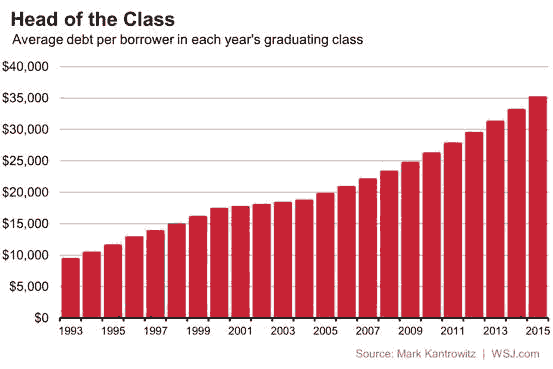In my books and classes on negotiation I specifically recommend long-term flexibility in contracts. As circumstances change, so must agreements between responsible partners. As a professor at the University of California I am deeply disturbed by the growing problem of student loans as portrayed in the graph below. And this graph omits the coming problems of inflation and the associated rise in interest rates. My advice? Skip your April payment. Why? Read more.

Of the estimated $1.4 trillion outstanding as student loan debt most will be repaid. Recently the Economist magazine estimated that of the 43 million Americans with student loans, 7 million (or about 16%) are in default.
Today the nation’s largest lenders, among them Wells Fargo and J.P. Morgan, announced proudly the wonderful benefits to them through “their renegotiated” contracts with the American people, that is, the Trump tax cut. Moreover, the law states that such windfalls should not go to just bank executives and shareholders. The seminal law on the fiduciary responsibilities of firms is crystal clear on this last point. The Michigan Supreme Court decision in the case of Dodge vs. Ford Motor Company in 1919 states: “…a business corporation is organized and carried on primarily for the profit of the stockholders.” Most on Wall Street are ignorant of or just plain ignore the key word in the opinion, “PRIMARILY.” The Court did not say “only” or “solely.” “Primarily” directly implies secondary and tertiary constituencies. Giving some of that money back to student loan holders not only serves them directly, but also the greater public in the long run. That is, there is a trickle effect in all directions when education is supported.
So my negotiation advice is for lenders and borrowers sit down and renegotiate the terms of their contracts. The problem is, unlike Walmart raising wages, Wall Street has not yet called out its broader responsibilities. My advice to you bankers and legislators out there: Consider the long-term brand equity associated with strengthening your relationships with a generation of borrowers.
So, I have some very specific negotiation advice for those of you struggling to pay off your student loans. Protest by using the power of your numbers to force open a dialogue with the lenders and Congress about renegotiating the terms of all student loans nationwide. This is a way to vote with your checkbook – by keeping it closed!
The current laws that prevent* bad student loans from being discharged through bankruptcy are a kind of indentured servitude outlawed in this country more than a century ago.
The rules disallowing bankruptcy must be eliminated. Why should student loans be treated differently from credit card debt? Why should students defaulting on student loans be treated differently than Donald Trump? Indeed, Politifact reported in 2015: “Hundreds of companies” have filed for bankruptcy, Trump said earlier in the debate. ‘I used the law four times and made a tremendous thing. I’m in business. I did a very good job.’”
Providing relief through bankruptcy to students and graduates with financial difficulties should be only the first step in resolving this huge fiscal burden we’ve pushed into the future and onto our young people.
Here’s how:
- For the month of April 2018 skip your loan payment. You might send in a polite note saying that you will catch up next month. This kind of protest is quite similar to renters’ strikes** that have proven effective in that arena. NOTICE, I am not saying “don’t repay your loan.”
- Urge all your friends to do the same – you can even send this information along to them. Indeed, host a “Skip a Payment” party on April 1st.
- Perhaps the banks and collection agencies won’t just scream bloody murder? But, in any case, they will be too overwhelmed with the paperwork associated with 43 million protestors to take remedial action against anyone.
- The financial markets will shudder.
- Congress will react.
- They will be forced to pass legislation allowing student loans (just like credit card debt) to be discharged through bankruptcy.
- Congress might even be forced to limit the usury of the banks and other lenders to an interest rate equal to the prime rate the banks are themselves charged by the Federal Reserve.
All this can be escalated by a second protest, “Skip Your July and August Payments,” and so on. Acting simultaneously is key. It concentrates your impact. This will provide a very real deadline for Congressional action. Indeed, other forms of forgiveness can be considered as well.
The student loan programs started out with good intentions, helping all to get a great education. Then the profiteers among us got hold of things, and helping has turned into hobbling. Let’s fix that!
*Some argue that it is possible in some cases to discharge student debt via bankruptcy. See this excellent article in US News to learn more.
**For information about renter strikes see this Wikipedia article.
For more information on renegotiating contracts see our book, Inventive Negotiation, Chapter 14, “Reviewing and Improving,” including the story of Jobs and Iger and Toy Story.